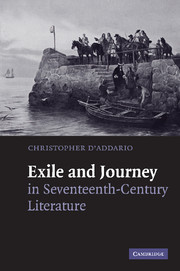Book contents
- Frontmatter
- Contents
- Acknowledgments
- Introduction: The “remanence” of the past: the early modern text in exile
- 1 Nostalgia and nationalism in New England literature
- 2 Exile and the semantic education of Thomas Hobbes's Leviathan
- 3 The expulsion from Paradise: Milton, epic and the restoration exiles
- 4 Sybil's leaves: Dryden and the historiography of exile
- Epilogue
- Notes
- Index
Epilogue
Published online by Cambridge University Press: 22 September 2009
- Frontmatter
- Contents
- Acknowledgments
- Introduction: The “remanence” of the past: the early modern text in exile
- 1 Nostalgia and nationalism in New England literature
- 2 Exile and the semantic education of Thomas Hobbes's Leviathan
- 3 The expulsion from Paradise: Milton, epic and the restoration exiles
- 4 Sybil's leaves: Dryden and the historiography of exile
- Epilogue
- Notes
- Index
Summary
In 1688, around the time that William of Orange was marching his way to the English crown, across the Channel the Swiss doctor Johannes Hofer was writing a medical dissertation that examined the homesicknesses of domestic servants in Germany and Swiss soldiers fighting abroad. Hofer created the term nostalgia (from two Greek roots meaning “a longing for home”) to define his newly diagnosed disease of displaced peoples. Hofer's diagnosis of this strange version of homesickness, in which people became incapacitated by sounds, smells and sights that evoked the homeland, helped to identify this existing psychological affliction, as well as encourage its spread across Europe. The confluence of the discovery of the disease of nostalgia and the triumph of William III in England seems to me worthy of a moment's reflection. Just as William's forces, some of whom were fighting in a foreign land, were participating in one of the more epochal political transitions in the grand arc of English history, Hofer was recognizing and pondering the profound impact that these types of transitions, as well as other types of dislocations, had upon individual experience. While nostalgia is often communal and political in its ideological trajectory, spurring invasions or wars much like the one in which William's soldiers participated, because its roots lie in memory and desire its manifestations are often deeply idiosyncratic, affective and personal.
- Type
- Chapter
- Information
- Exile and Journey in Seventeenth-Century Literature , pp. 149 - 151Publisher: Cambridge University PressPrint publication year: 2007



